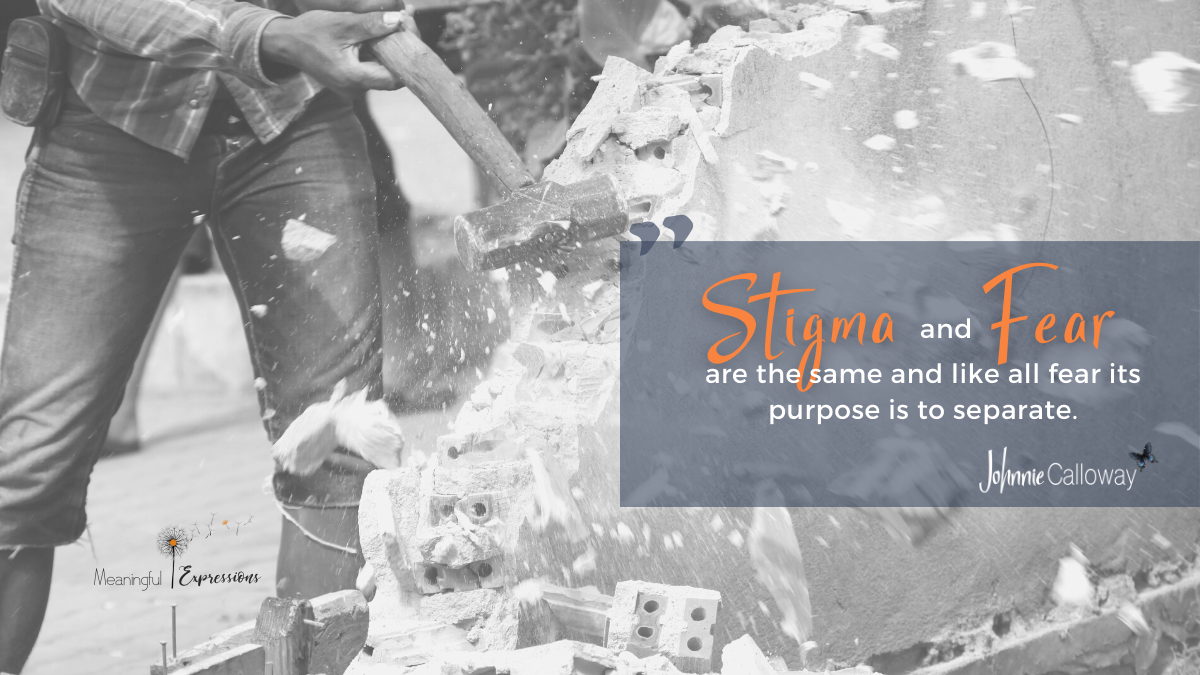Breaking Through the Stigmas
I was waiting my turn at the podium. I was actually sweating and nervous as could be. I had spoken many times before and usually really enjoyed it. This time was different. I knew that I had to share some things I had never shared before.
It was a twelve-step meeting and many of the people in that room knew me. I think I can honestly say that most of them even respected me. They also knew me to have a sense of humor and enjoyed that I could talk about our shared challenges in a way that allowed us to have a good laugh together.
This particular night, though, I was not sure our challenges were shared. I felt different, like an outsider in a room full of people that I had called family for many years. I had come face to face with an issue and I was terrified that even this loving family would shun me over. I did not think I could find any part of it that would be humorous.
I had been without drink or drug for over sixteen years and was very vocal at these meetings from day one. I just always felt, whether it was true or not, that I had something of value to add to the discussion. But on this evening, I was not certain about that at all.
I was just coming out of a two-year emotional struggle with suicidal obsessions, panic attacks and a crash that led me to a seven-week hospitalization and two months in a homeless shelter. I hadn’t known from one moment to the next if I was going to act on the obsession of suicide that had carried me so far into the darkness which I wasn’t sure I would ever come out of. But I had found a good therapist and got on the right medication, and somehow, got through it all without turning back to drugs or alcohol.
My friends in that room that night had known me to be depressed over the years, some might have even known that I had passing thoughts of taking my own life. None of them knew how far down the scale I had gone until I was hospitalized and homeless.
I had always written my bouts of depression off as situational depression. My often-used words were, “You would be depressed too if you had all the things going on that I do.”
But tonight, this night, I was going to reveal to my adopted family, that I had been diagnosed as having bipolar disorder, PTSD, clinical depression and severe anxiety disorder. I felt as though I may as well be telling them I was the son of Satan.
Many times, in our twelve-step meetings speaking of such matters had been considered ‘outside issues’ and generally frowned upon as meeting material. I had been involved in those meetings for over twenty-two-years. I felt like I owed it to the others to speak up. I wanted them to know it is okay to be different. Maybe, I also needed to know myself it was okay.
And so, I took the step and told the group about my recent struggles, my new diagnosis, and what I was doing to manage it. Instead of being rejected at the meeting, about a dozen people came up to me afterwards and in one way or another, said, “Thank you for saying what I can’t.” If there were people there who’s opinion of me changed, it didn’t really matter so much to me because of all the people who were helped by my sharing.
After that night my story changed. Now I make sure to include the fact that I have mental health issues and that I take medications. I am still concerned sometimes about how well this self-disclosure will be received by people, but I am willing to face the stigmas and move on.
I live a fully functioning productive life today. I do not think that too many people would watch me as I move through the world and guess that I had any of the above-mentioned issues or challenges. I make sure to stay on my medication, because that balances my brain chemistry enough for me to watch my thoughts. I have learned how to manage my thinking and keep myself from slipping down the slope and into that darkness.
I believe today, there are many among us who have recovered from mental health issues and yet no one knows their story. We all want to be liked, loved and even respected. The paralyzing fear of stigma stifles us and keeps most of us quiet. Therefore, what the world usually sees of bipolar disorder, PTSD or addictions are the people who are still struggling, maybe without help or needed medications, and so the truth of how many of us have successfully recovered and moved on is not generally seen.
So, if you are one who has recovered or is on the road to recovery from any of these issues, I encourage you to speak up and let others know that recovery is possible. Let’s give them some hope. You do not have to become a speaker, write a book, or an article. There are less public ways you can let others know you and your story. Also, if you are still struggling, please find a safe place to be heard and receive help.


